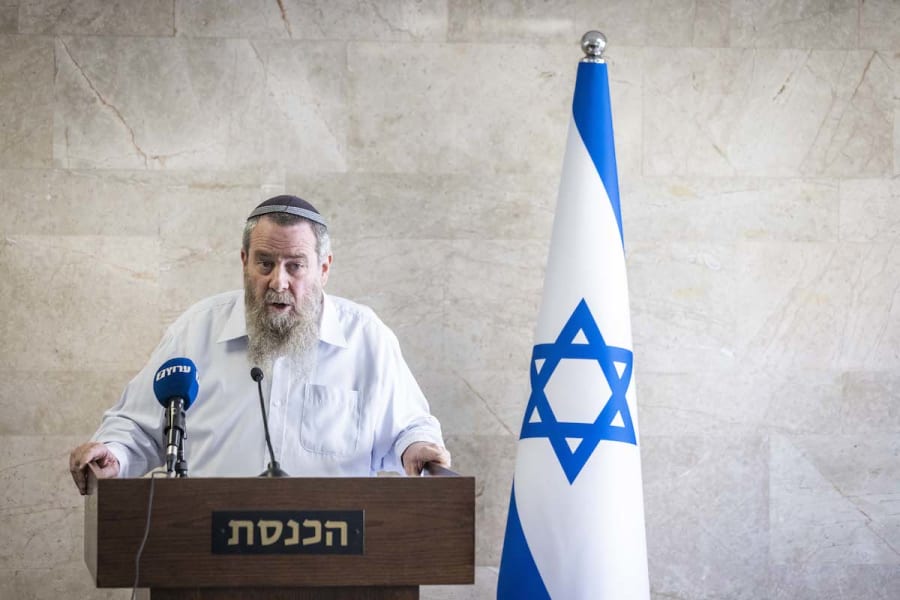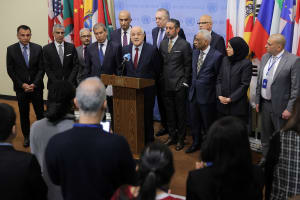How a one-man party was able to seize power in Israel’s elections

One of our great Hebrew slang terms is “protectzia,” which means being able to access what you need or want simply because you know the right people, who can pull strings for you in order to help you achieve goals which, under ordinary circumstances, wouldn’t have been possible.
No other word seems to be more suited to Avi Maoz, the one-man member of his own political party, named Noam, who “got by with a little help from his friends.” Those friends were none other than Itamar Ben Gvir, head of the Jewish Power party and Bezalel Smotrich, head of the Religious Zionism party. With seven mandates going to Ben Gvir, six going to Smotrich and one going to Maoz, the three constitute one bloc which made the difference for Benjamin Netanyahu, known as Bibi, in the Israeli elections held on Nov. 1.
How did they make such a difference? Once Ben Gvir and Smotrich realized that teaming up would either make or break Bibi, since he needed the 13 mandates that the two of them brought together, they sweetened the deal for their shared agenda by further attaching Avi Maoz to their own little coalition. It was a “natural” pairing, since Maoz’s personal goals, for a much more observant Jewish state, line up so well with their own aspirations.
Raising their number to a whopping 14 mandates, a very impressive number for three men who were hardly a blip on the screen until recently, they were then able to pull off a “take it or leave it” deal – basically letting Bibi know that it’s all or nothing. Without those 14 mandates, no Netanyahu government would be possible, and if that’s not putting the squeeze on someone, then nothing else does.
They say that politics makes strange bedfellows, but, in this case, these three are only too happy to share the bed since they all have the common goal of molding Israel into their specific image of how it should look.
In this case, they want it to look considerably like a nation that will be much less inclusive of those who are not observant Jews (in the Orthodox fashion), one which would be highly suspicious of every prospective immigrant, demanding pristine documentation which assures that Jewish pedigrees are without stain or question, and one which would try to control every aspect of life while trying to force-feed its brand of religion on everyone.
The reach of these three men, if they get their way, would affect areas of education, immigration, the proposed option of civil marriage, as well as the possibility of marriage being performed by rabbis of all Jewish streams, burial, birth registration, marginalized groups within the country, the role of women in the military, a desired overhaul of the legal system and much more.
The sheer prospect of a dramatically changed Israel has not only been of great concern to many of Israel’s citizens, the vast majority of whom would not like to be dragged in a more religious direction, but also to the global community of diaspora Jews, who are beginning to express what they believe to be justified worries because they feel the disconnect taking place right before their eyes.
Among these Jews are those who are young, able to adapt and regroup, if they see the growing trend of anti-Semitism having an impact on their comfortable way of life. It’s probably fair to say that many are non-observant, holders of more liberal viewpoints or have intermarried.
Rather than continuing to believe that Israel is their “ace in the hole,” they have to live with anxiety, knowing that there’s a good chance that they may not, at all, be welcomed into a country which expects its prospective citizens to walk in lockstep with its new leaders believe.
While it’s true that most Israelis are in favor of honoring and respecting Shabbat, observing religious holidays and living a Jewish lifestyle, probably the majority also agree that you cannot legislate such choices or hold all citizens hostage to the ideas and laws of one bloc which hopes to determine the face of Jewishness from here on out. Legislation, by force, is generally met with resistance, and a heavy-handedness by these three men, who were clever kingmakers for Bibi, might just have overplayed their hand.
It could be that once they begin to take on the large tasks of figuratively changing Israel’s climate, they will likely be met with an unexpected amount of opposition, for which they never bargained.
Already, “more than 50 local authorities announced on Saturday that they will not cooperate with the policies of far-right MK Avi Maoz’s Noam Party.” Those municipalities extend from the south to the center and up to the north of the country.
So, while protectzia assisted this trio in making sure their political agendas are realized, it could also be that this obvious and coordinated power grab will end up actually doing the opposite of what they intended.
In the end, Israelis who lean heavily on the side of tradition are also very fair-minded. As those who pride themselves in ruling justly, possess a conscience and show mercy to those in need, they might just conclude that one voice, one expression and one indoctrination are not the desired face of the country they have always supported.
This experiment, in trying to force one’s brand of Judaism on more than 9.5 million citizens, has yet to work, and if it fails to do so, the next elections could look very different from this last one.
Strong-arming a party by way of merging compatible political players might work to get your place at the table, but in order to stay seated at the table, you also have to win the hearts, minds and admiration of those you are representing.
Without that, it’s back to the drawing board – in our case, another election – but this time, with a better understanding of how and why we got to that point yet again.

A former Jerusalem elementary and middle-school principal and the granddaughter of European Jews who arrived in the US before the Holocaust. Making Aliyah in 1993, she is retired and now lives in the center of the country with her husband.













